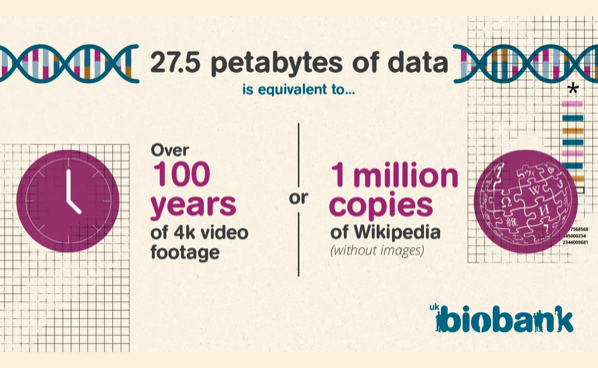5 years, £230 million, over 350,000 hours – that is the scale of work involved in UK Biobank’s project of genome sequencing of its half a million volunteers. The UK Biobank aims to improve the prevention, diagnosis and treatment of a wide range of diseases by providing researchers with access to its rich and diverse data. The final set of whole exome sequencing data was released for 470,000 participants in 2022.
Whole genome sequencing (WGS) is a technique that reads the entire DNA code of an individual, which consists of about 3 billion letters. The genome is the set of genetic material present in the cells of an organism, which contains the instructions for building and maintaining that organism. In genome sequencing, the DNA is analyzed to identify the order of its nucleotide bases (adenine, thymine, cytosine, and guanine, abbreviated as A, T, C, and G).
WGS can help researchers to discover rare and novel genetic variants that are associated with diseases, traits, and drug responses. This unique and powerful resource will advance the understanding of human biology and improve the health and well-being of millions of people.
KnowALLedge Plus:
>The UK Biobank WGS project was funded by a public-private partnership involving the UK government, the Wellcome Trust, and four pharmaceutical companies: Amgen, AstraZeneca, GlaxoSmithKline, and Johnson & Johnson.
>The sequencing was carried out by two leading genomics institutes: deCODE Genetics in Iceland and the Wellcome Sanger Institute in the UK. The project started in 2018 and was completed in 2023, generating 27.5 petabytes of data.
>The UK Biobank WGS data is now available to approved researchers through the UK Biobank Research Analysis Platform, which is a secure cloud-based platform that allows researchers to access and analyse the data online.
>The UK Biobank WGS data is expected to have a huge impact on biomedical research and innovation. It will enable researchers to identify new genetic risk factors, biomarkers, and drug targets for a wide range of diseases, such as cancer, diabetes, Alzheimer’s, and cardiovascular diseases.
